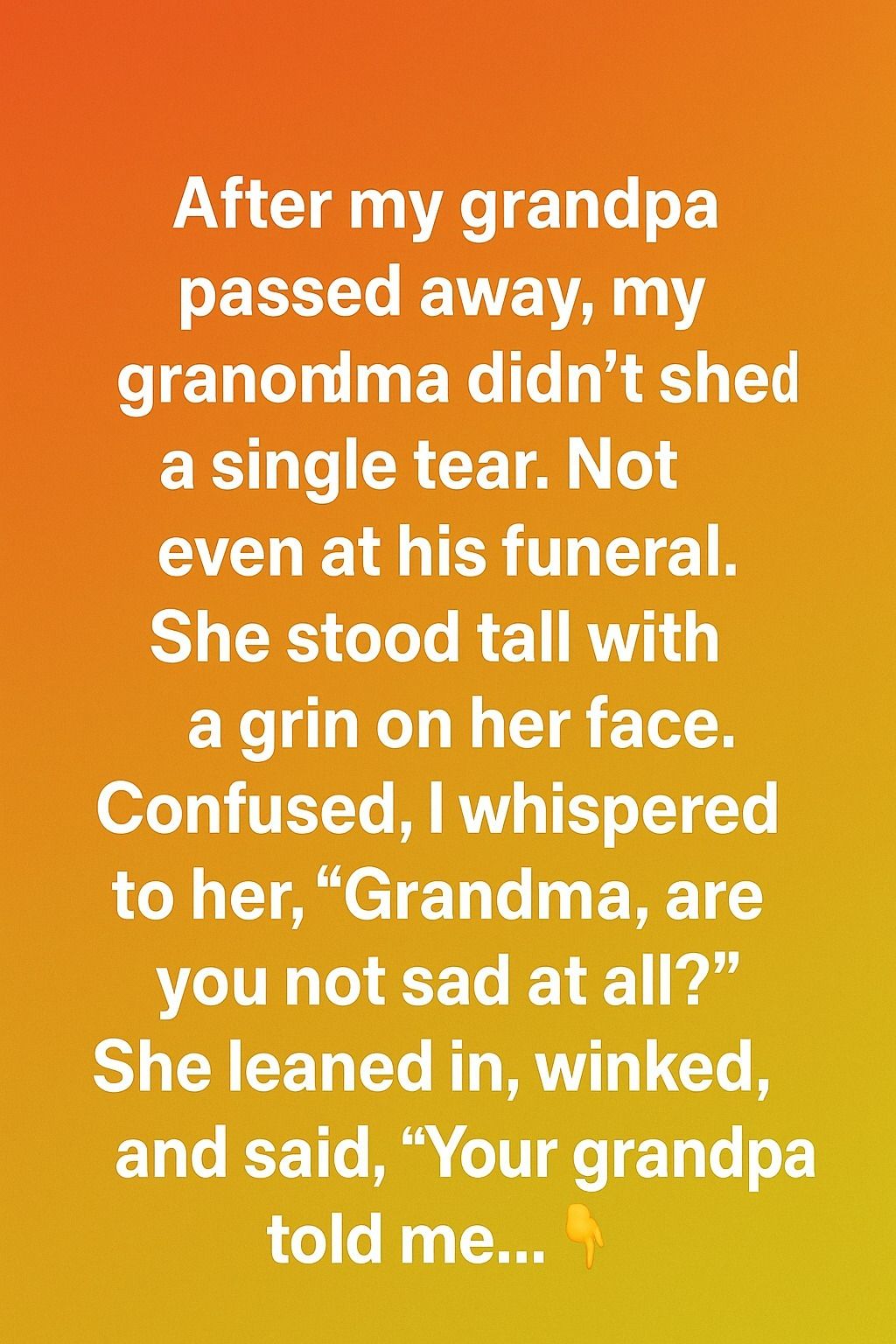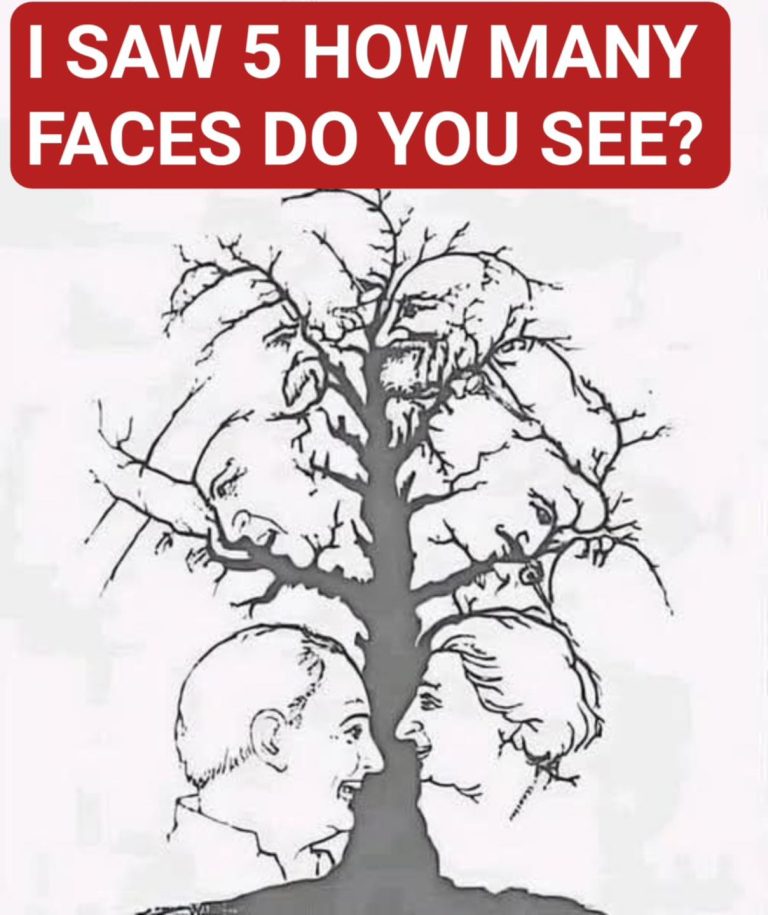
After my grandpa passed away, my grandma didn’t shed a single tear.
Not even at his funeral.
She stood tall with a calm, almost peaceful grin on her face.
Confused, I leaned toward her and whispered,
“Grandma, are you… not sad at all?”
She turned to me, her eyes soft but steady. Then she leaned in, winked, and said quietly,
“Your grandpa told me not to cry when he left — because he’d find a way to make me smile again.”
I remember those words sitting heavy in my chest that day.
I didn’t understand them.
How could she smile when the man she’d spent sixty-two years beside — her best friend, her partner in everything — was gone?
While the rest of us sobbed, Grandma stayed composed. She even greeted guests, thanking them for coming, offering hugs, and joking that Grandpa would’ve hated all the attention.
It felt strange, almost wrong… but also strangely beautiful.
A week later, I visited her.
Her house smelled like lavender and old books, the same comforting scent that always made me feel like a child again.
She was sitting in her rocking chair by the window, knitting something soft and white.
“Grandma,” I said carefully, “how are you really doing?”
She smiled — that same mysterious smile from the funeral.
“Oh, I’m alright, sweetheart. He’s been talking to me.”
My heart skipped.
“Talking to you?” I asked, trying to mask my worry.
“Yes,” she said, chuckling softly. “Not in a spooky way. In his way.”
That night, she told me their story — one I’d never heard before.
When they were young, just after getting married, Grandpa had enlisted in the Navy. He’d be gone for months, sometimes a year. Grandma said she used to cry herself to sleep every night.
Then one morning, she found a note tucked under her pillow.
It was from him — short, simple, written before he’d shipped out:
“If you ever miss me, look for my signs.
I’ll find a way to make you smile — always.”
That letter became their secret.
Every time he left, she’d find little signs.
A song they loved playing unexpectedly on the radio.
A daisy — her favorite flower — blooming out of season.
Once, even a heart-shaped cloud on the day she’d nearly given up hope.
And every time, she’d smile and whisper, “I see you.”
After he passed, she told me, she’d been waiting for one of those signs again.
Something small.
Something that said, he’s still here.
And then, one morning, it came.
She’d woken up to find his old pocket watch — the one that hadn’t worked in years — ticking softly on her nightstand.
The time? 6:17.
Their wedding date.
When she told me that, I didn’t know what to say.
Goosebumps ran up my arms.
She just kept smiling, gently touching the gold watch face.
“See? He told me not to cry,” she said. “He knew he’d still find me.”
After that day, I stopped worrying about her.
But something about that story stayed with me — the way she carried her love not as grief, but as gratitude.
A few months later, Grandma began to slow down.
She still cooked, still tended her rose bushes, but her hands trembled a bit more each week.
I started visiting her every Sunday. We’d sit by the window — the same one where Grandpa had proposed to her sixty-five years earlier — and she’d tell me stories.
Stories of love letters during war.
Of dances in the kitchen.
Of how Grandpa used to sneak cookies from the cooling rack when he thought she wasn’t looking.
Each memory made her laugh — and made me realize how rare it is to witness a love so deep that even death couldn’t untangle it.
Then one Sunday, I showed up and she wasn’t in her chair.
I found her in the garden, sitting on the grass in her housecoat, staring up at the sky.
Her face was wet — not from tears, but from rain.
She was laughing.
Laughing like a little girl.
“Grandma?” I called. “What are you doing out here?”
She looked over her shoulder and said, “He did it again.”
I walked closer, confused.
“Who?”
“Your grandpa,” she said, pointing at the sky.
And there it was — a full rainbow stretching right over their house, brilliant and perfect.
“He always promised me he’d send one when it was time,” she whispered.
“Time for what?” I asked.
She smiled through trembling lips.
“To go see him.”
That night, Grandma passed away in her sleep. Peacefully.
No pain. No fear.
On her bedside table was the same pocket watch, still ticking softly.
The time? 6:17.
And next to it, a small piece of paper — written in her neat cursive:
“He found me again.
Don’t cry for us — love never dies. It just changes rooms.”
It’s been years since they both left, but every now and then, when I see a rainbow or hear one of their favorite songs on the radio, I catch myself smiling.
And I swear, for just a second, I can hear Grandma’s laugh.
That gentle, knowing laugh that says:
He kept his promise.



